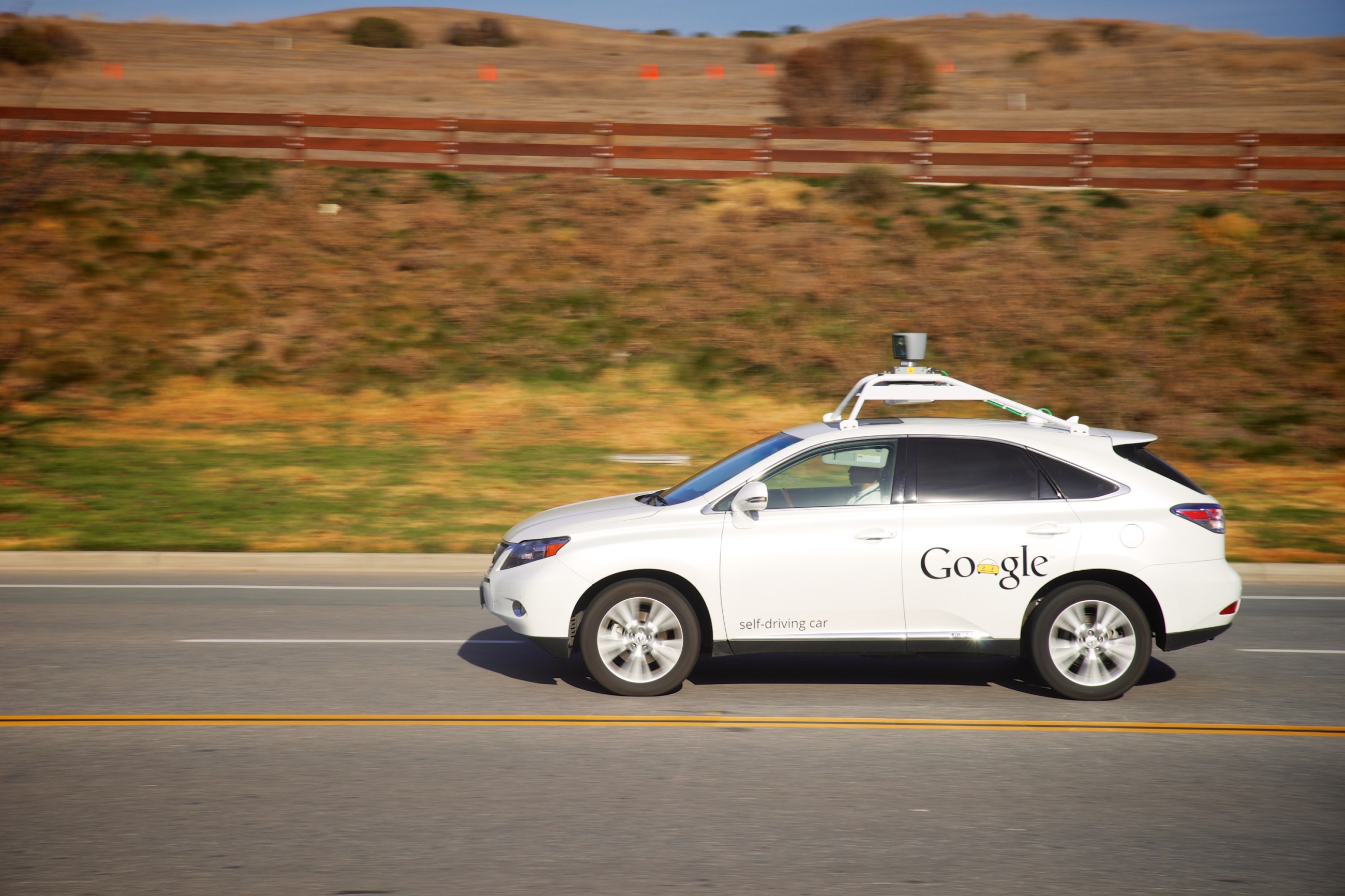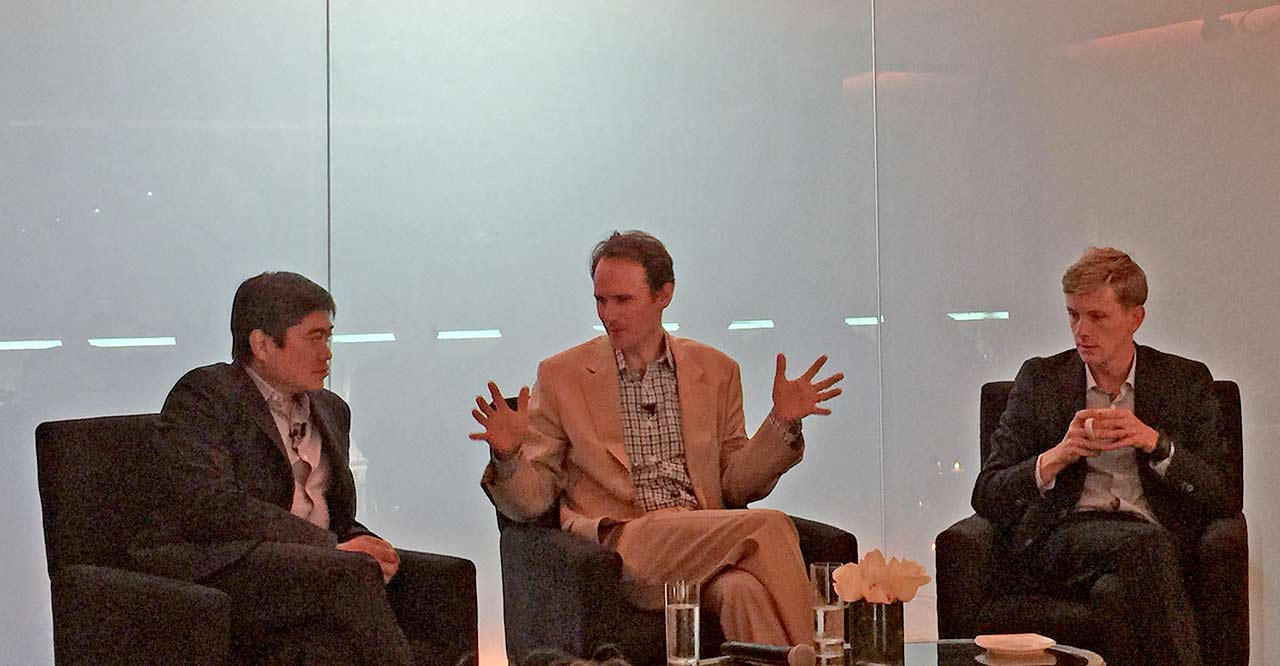
Our self-driving cars may be ready soon, but are we?
Google self-driving car photo (cc) by LoKan Sardari on Flickr.com
It’s the not-too-distant future.
You’re riding in your self-driving automobile through the streets of a bustling city when a classic car from 2015 runs a red light and hurtles head-on towards you.
If you were driving, you might steer the car toward the sidewalk. But what if a group of children was standing there? With only a millisecond or two to process this, you might try steering toward them to save your life. A “thinking” car, however, might not. An algorithm embedded in the car’s brain might decide colliding head-on with the red-light runner would cause the least loss of life. Except the life might be yours.
What would you do? What should the car do? And who decides?
That question was posed by Joi Ito, director of the MIT Media Lab and a member of the Knight Foundation Board of Trustees, as he helped kick off a strategy discussion about how changes in our society will affect organizations such as Knight that invest in the seeds of change. Ito and Trustee Chris Hughes, co-founder of Facebook, discussed the issues during an internal Knight panel in Miami about what the future holds for the Web and the flow of information.
Board Chair John Palfrey moderated the discussion.
“What’s the role of humanity in this new world where artificial intelligence is going so fast?” asked John Palfrey, head of school at Phillips Academy, Andover and a director of the Berkman Center for Internet & Society at Harvard University. “What does the new humanism look like?”

Knight Foundation trustees Joi Ito, Board Chair John Palfrey and Chris Hughes. Photo by Michael D. Bolden.
That question underpinned two days of conversations during the Knight Foundation Board of Trustees’ third-quarter meetings in Miami. The board explored how Knight’s strategy of funding innovation to promote informed communities needs to evolve so that we can continue, in the historic words of co-founder John S. Knight, to “bestir the people into an awareness of their own condition, provide inspiration for their thoughts and rouse them to pursue their true interests.”
Policing what we don’t understand
Determining a direction may be made even more difficult by our inability to understand how some systems work. Ito, a noted angel investor, cited stock markets as an example, where the actions of computers themselves can trigger huge swings in valuations.
“We don’t even know why things happen the way they do… because there are so many machines talking to one another,” he said. “It’s an ecosystem that evolves and acts on its own… We can sort of guess what happens, but we don’t know.”
Ito said that some of society’s innovators “are trying to get ahead of the curve” by thinking through these issues, which have wide policy ramifications. “Some of these ‘techno-utopians’ believe they can build a global ethics into the fabric of artificial intelligence,” better than the ability of government to keep pace with the ethical issues raised by technology.
“I don’t think [those] in charge of the computers should decide,” Ito said. “The people should decide.”
Hughes, publisher and executive chairman of The New Republic, agreed that there is a “need for proactive public policy that will make such systems work… The system does not work as long as there is a single egoistic element,” such as a car driven by a person who could make the decision to save his own life in a world where most cars are controlled by computers that speak to one another.
Ito posited that in such a world individuals might not even own cars, or similar technology and tools.
“Do self-driving cars just become part of the infrastructure?” he asked.
And it’s not even a question about whether computers should be in charge of certain activities. Computers and the algorithms that drive them are just better at some things than people ever will be, Ito said. An algorithm, for example, would be better at writing a tax code than a human, he said, if you set the parameters and told it what the ethics should be.
While Ito focused on the coming effects of artificial intelligence and “machine learning,” Hughes said technology is also disrupting the everyday, now.
“We’re on the cusp of a major and radical change when it comes to employment and work,” he said, in an array of industries, from automobiles to health care to food service and education, with technology making some tasks more efficient and bringing costs down. But that also means that the duties people perform are changing, affecting “everything from economics to politics,” and beyond.
“I can see several scenarios where the nature of work changes totally,” Ito said. “I can imagine a whole bunch of jobs that we target now being eliminated but a whole bunch of jobs being created in their place.”
Changing responsibilities of the media
Changing technology is also bringing a cascade of change to the media, which has broad implications for companies in the sector and organizations such as Knight that seek to improve the quality of information and how it flows to communities.
Ito said journalists themselves need to be better prepared to help people understand the ethical issues and what is at stake. “To me, there is a bunch of journalism that will become irrelevant,” he said.
“Ethics may be the layer where we are having the conversation and it becomes less about the data and the details,” Ito said. “For journalists the ability to understand what’s going on becomes much harder.” That could change not only what journalists write about and how they do it, but the education system that prepares them for their jobs.
These changes are emerging in a swiftly changing media landscape being changed by new investments and new players.
“This is arguably the best time to be a media entrepreneur in at least the last 20 years or so,” Hughes said, with generous streams of capital and huge media companies such as Buzzfeed, VICE and Vox that have market capitalizations of near $1 billion. Innovations in storytelling also make it an opportune time for “journalists who have the right skills,” he said.
Those opportunities are emerging in a landscape that is increasingly bifurcated, with “traditional” journalism, often supported by foundations or institutions, on one side and content providers, who might sell their products to an array of third parties, on the other.
The discussion covered both the near term and the ramifications of future technology, but Trustee Ray Rodriguez cautioned against staring too hard into the crystal ball to discern how to form strategy.
“The timing of trends is as important as looking at the trends,” said Rodriguez, former president and COO of Univision Communications. “When you look at today and probably the next few years, traditional media is still the leader by far. … I worry sometimes that we look too far into the future.”
Michael D. Bolden is editorial director for Knight Foundation. Email him at [email protected] and follow him on Twitter @michaelbolden.
Recent Content
-
Communitiesarticle ·
-
Communitiesarticle ·
-
Communitiesarticle ·


